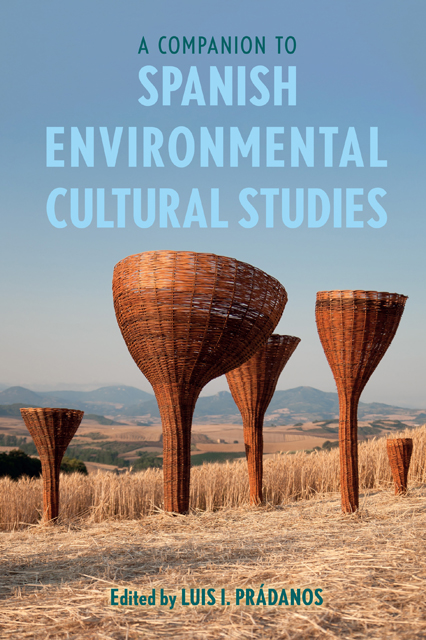Book contents
- Frontmatter
- Contents
- List of Illustrations
- List of Contributors
- Note on the Translations
- Acknowledgements
- Introduction: Spanish Environmental Cultural Studies
- Part I Environmental Cultural History and Political Ecology
- Part II Water and Power
- Part III Ecologies of Memory and Extractivism
- Part IV Animal Studies and Multispecies Ethnographies
- Part V Food Studies and Exploitative Ecologies
- Part VI Ecofeminism
- Part VII (Neo)Colonial and Racialized Ecologies
- Part VIII Tourism and the Environmental Imagination
- Part IX Eco-Mediation and Representation
- Part X Trash and Discard Studies
- Bibliography
- Index
20 - Ecopoetics
Published online by Cambridge University Press: 08 June 2023
- Frontmatter
- Contents
- List of Illustrations
- List of Contributors
- Note on the Translations
- Acknowledgements
- Introduction: Spanish Environmental Cultural Studies
- Part I Environmental Cultural History and Political Ecology
- Part II Water and Power
- Part III Ecologies of Memory and Extractivism
- Part IV Animal Studies and Multispecies Ethnographies
- Part V Food Studies and Exploitative Ecologies
- Part VI Ecofeminism
- Part VII (Neo)Colonial and Racialized Ecologies
- Part VIII Tourism and the Environmental Imagination
- Part IX Eco-Mediation and Representation
- Part X Trash and Discard Studies
- Bibliography
- Index
Summary
Introduction
Ecopoetics is, sensu stricto, the theory that underpins any poetic practice and any other literary form that makes ecology and environmental consciousness its foundation and starting point. As a true aesthetic speculation, and under the rubric of “Poetics of Breathing,” I have constructed a general ecocritical theory with the aim of making the metaphor of breathing agglutinate the different and even contending literary and critical tendencies within Hispanism that pay attention to the ecosystemic flows of life. But theoretical developments are an exception; most ecopoetics are not to be found in speculative hypotheses but implicitly in the practices of literary criticism of Spanish and Hispanic literatures and in Iberian cultural studies that involve environmental issues of literary interest. Most ecopoetics take the form of specific ecocritical studies on the voices of the earth that some poets hide, on the narratives of abandoned rural enclaves and migrations to cities, and on the wide range of approaches to animals in literature. Ecopoetics also permeates arts theory and practice when embedded in environmental concerns. In a broad sense, ecopoetics affects cultural studies that analyze post-growth imaginaries to question capitalism and its metabolic destruction of biological and epistemological diversity, the devastation of landscapes under the effect of the tourist industry, national regulation of biopolitical issues such as bullfighting, and cultural understandings of nature and legal texts on landscape and hunting. In a much broader sense, ecopoetics have an important presence in the many academic research practices that address the woes of economic “development,” animal ethics, the food industry, the role of nature in education, landscapes and ideology, minorities and law, gender and values, post-carbon societies, and other related topics, as these are all cultural issues of great significance for ecologically engaged narratives and poetries.
Ecopoetics responds to the current ecological crisis of planetary dimension and is the poetics of the Anthropocene and the future to come. Nevertheless, and as noted above, there are four main areas in which ecopoetics acquires a relevant role, all of them related, in descending order, to the original literary and theoretical foundations of the classical understanding of the word “poetics” as “a treatise on poetry or aesthetics” (Merriam-Webster): literary theory, literary criticism, environmental humanities, and cultural studies.
- Type
- Chapter
- Information
- A Companion to Spanish Environmental Cultural Studies , pp. 215 - 222Publisher: Boydell & BrewerPrint publication year: 2023



